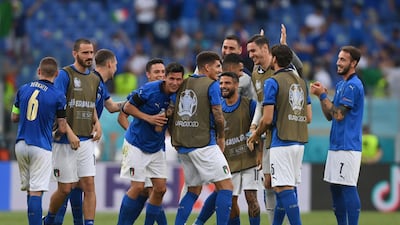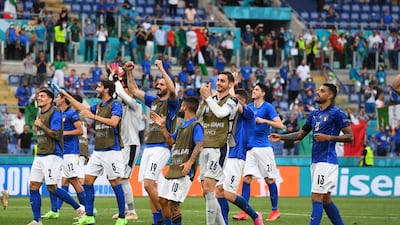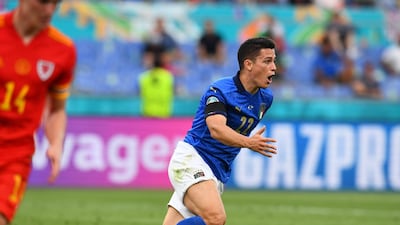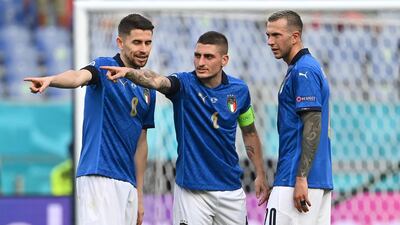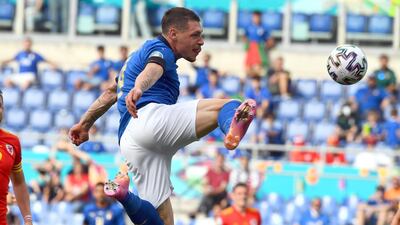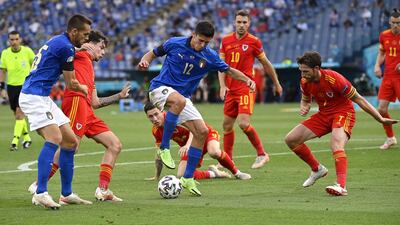If Italy, rapidly establishing their potential-champion credentials, are to be at the prize-giving ceremonies at the end of Euro 2020, every man in blue will believe they earned their medal. Not the least of the impressive tactical plans put on show in the group phase by manager Roberto Mancini is his strategy of inclusiveness.
With a minute of normal time left on the clock in Rome on Sunday evening, Mancini made the last of his five substitutions in the win over Wales. He took off his goalkeeper Gianluigi Donnarumma for the long-serving deputy keeper Salvatore Sirigu. The change had nothing to do with fitness issues or concerns about how Italy were managing their 1-0 advantage. Mancini wanted Sirigu to have participated in the tournament.
It felt important that the 34-year-old should, if only for a few minutes, not feel like the perpetual, unused understudy. Sirigu has been that for longer than a very fine goalkeeper should really expect. His bad luck is to have coincided first with Gianluigi Buffon, the legendary and apparently ageless keeper whose Azzurri career stretched over 21 years and 175 caps, until 2018, and then with Donnarumma, who while still a teenager, had been earmarked very clearly as Buffon’s heir.
On Monday, Donnarumma was undergoing the last medical formalities to complete his move from AC Milan to Paris Saint-Germain and a contract that will make him, at 22, one of the best-paid goalkeepers in the history of club football. Sirigu was for a long, successful period first-choice at PSG, winning four Ligue 1 titles, though he never had the superstar status that will surround Donnarumma in Paris.
In Italy’s three victories at the Euros, Mancini has given game-time to 25 of his 26-man squad – second-reserve keeper Alex Meret may have to sit the tournament out, as he would expect – and was able to establish that sense of inclusion because of their strong position at the top of Group A.
Only three players from the starting XI against Switzerland four days earlier were retained against Wales. But for at least an hour, Mancini watched an Italy with the same speed, invention and vigour that had impressed in the first two games, 3-0 wins over Turkey and the Swiss.
“I was very pleased to be able to change eight players and see the team still play very well,” Mancini said. “We could have scored more, but Wales were very defensive, with everyone behind the ball.”
Down to 10 men for the last 40 minutes following Ethan Amapadu’s red card, the Welsh, needing a narrow-scoreline defeat to hold their runners-up position in the group, put numbers into protecting their goal and helping out their wing-backs, who had a torrid evening against the inventive Federico Chiesa and Federico Bernardeschi.
_______________
Wales 0 Italy 1: player ratings
_______________
The two Federicos had come into the Italy side for Lorenzo Insigne and Domenico Berardi, both of whom have been impressive. The goalscorer against Wales, Matteo Pessina, and the midfielder Marco Verratti, who set up Pessina’s goal, had come in for the dynamic Nicolo Barella and Manuel Locatelli, who scored twice against Switzerland.
Mancini now has genuine dilemmas about what constitutes his best front six ahead of Italy’s last-16 match at Wembley on Saturday.
“There are so many players who deserve to be involved,” said Mancini, "but it’s better to have many available than to be forced into choices.”
Injuries have shaped some of Mancini’s picks in defence, where right-back Alessandro Florenzi withdrew at half time against Turkey and captain Giorgio Chiellini went off with a muscle strain against Switzerland. But there is no crisis at the back. Italy extended their run without having conceded a goal past 1,000 minutes against Wales. They are now unbeaten for 30 matches, equalling the all-time Azzurri record.
All of which makes Mancini, the former Manchester City and Inter Milan manager, a very popular man. At the Stadio Olimpico his name was cheered as loudly as any Italian’s in the preambles to the kick-off against Wales.
His players seem to warm to him, too. Pessina, the Atalanta midfielder, hurtled towards the technical area after tucking away his neat volley in the first half, to celebrate up close and personal with the manager, the coaching staff and the players on the Italian bench – all of them now feeling very much part of the adventure.
